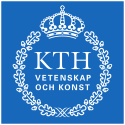 The KTH Royal Institute of Technology in Stockholm is the largest and oldest technical university in Sweden. No less than one-third of Sweden’s technical research and engineering education capacity at university level is provided by KTH. Several national research centres are hosted by KTH. KTH is also a major partner in two out of three European Knowledge and Innovation Communities formed by the prestigious EU organization EIT (European Institute of Innovation and Technology). KTH is an international university with many international researchers and students, especially at Master’s level. Extensive international research and educational exchange programmes allow for exchange with universities and colleges in Europe, the U.S. and Australia, but also increasingly in Asia. KTH is a partner in several international university networks such as CLUSTER and T.I.M.E.
The KTH Royal Institute of Technology in Stockholm is the largest and oldest technical university in Sweden. No less than one-third of Sweden’s technical research and engineering education capacity at university level is provided by KTH. Several national research centres are hosted by KTH. KTH is also a major partner in two out of three European Knowledge and Innovation Communities formed by the prestigious EU organization EIT (European Institute of Innovation and Technology). KTH is an international university with many international researchers and students, especially at Master’s level. Extensive international research and educational exchange programmes allow for exchange with universities and colleges in Europe, the U.S. and Australia, but also increasingly in Asia. KTH is a partner in several international university networks such as CLUSTER and T.I.M.E.
The Division of Environmental Strategies Research at KTH (KTH-fms) carries out interdisciplinary research in following fields: Sustainability and Environmental Assessments, Environmental Economics, Environmental Sociology, Sustainable Urban and Rural Development, Futures Studies for Sustainability and Policy Analysis. fms has a strong research profile in enviornmental Life Cycle Assessment (LCA), social LCA, Life Cycle Costing (LCC), and combines these approaches with policy analysis, explorative scenarios and backcasting. Given their significance for environmental performance and social well-being, energy systems are a particular area of focus alongside for example buildings, transportation, infrastructure and ICT. KTH-fms coordinate the sustainability assessment work in the REFLEX-project and contribute directly through work on social Life-Cycle Assessment of energy systems, LCA-based external cost assessment and to assessment of uncertainty in the external cost of greenhouse gas emissions. Moreover KTH-fmsalso contribute to establishing sociotechnical scenario descriptions and development of the sustainability assessment methodology.
